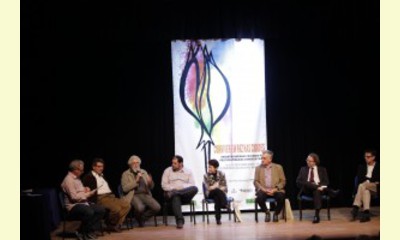|
|
Meeting on How to Build Peace in the City (Brazil)
an article by Conviviencia e Paz
At the opening ceremony, cultural and public
managers participating in the national meeting on
Peaceful Living in Cities were welcomed by the
Afro block at Ilu Obá de Min with an artistic
intervention that distributed flowers, music and
poetry.

click on photo to enlarge
The meeting emphasized the importance of democracy
for the strengthening of a culture that promotes
diversity and peace for all. They also discussed
the country's history, marked by cycles of
violence, such as colonialism , slavery and
dictatorships, since memory is a key resource if
one is to move forward with a new perspective :
that of freedom and equality of rights.
Attended the opening session were Pedro
Vasconcellos (Ministry of Culture ) , Marcelo
Araújo , State Secretary of Culture of Săo Paulo
(SP), Juca Ferreira , Municipal Secretary of
Culture of SP, Rogério Sotilli , Municipal
Secretary of Human Rights of SP , Nabil Bonduki ,
City Council Member of SP , UNESCO , Davy
Alexandrinsky , CNPC ( National Commission for the
Promotion of Culture) , Lia Diskin , Palas Athena
Association , and Hamilton Faria , the Polis
Institute .
" Where danger grows , grows also that which
saves. Culture of peace is not the absence of
conflict , difference and diversity . It is active
resistance , dialogue, positive feeling of love
for all others. We are the change we want to see
in the cities," said Hamilton Faria, director of
Polis, in his opening speech .
Lia Diskin from the Palas Athena Association ,
spoke about the importance of the collective and
of care for others . "We are born altruists,
needing a caregiver. We are children for years
under the constant care of someone else. We will
largely grow with the care of someone else,
starting life in this way and ending life this
way. Let us ask what happens in the middle of
this life that is born in fragility and that
leaves in fragility."
Summarizing the historical problems of the
country, Pedro Vasconcellos, the Ministry of
Culture, spoke about overcoming violence through
public policies that enhance our peoples and
cultures. "I consider that there is a strong
effort by public policies, particularly by the
federal government, to confront the a great
problem of Brazilian society, which is precisely
the issue of violence. We are a violent
patriarchal society, which is reflected in the
problems we see every day."
" We need an open discussion with the entire
Brazilian society about this world in which we
live, what is our role, what humanity do we want
and what world do we want . Our communities are a
great reference for these questions. We need a
law such as the Pachamama [ Mother Nature ] law in
Bolivia to deal with these issues," Vasconcellos
said .
(This article is continued in the discussionboard)
Click here for the original in Portuguese.
|








|
DISCUSSION
There is no question yet associated with this article.
* * * * *
LATEST READER COMMENT:
(The following is continued from the main article listed above.)
Davy Alexandrinsky mentioned the methodology of "listening" as a way to take back the streets and told about the project Papo in Subida , in which he recorded a testimony from a person in the community of Morro do Preventório, in Rio de Janeiro. The testimony gathered stories of the characters in the neighborhood , memories and affections.
" At this moment of time, when the streets are being taken over by the people, it is crucial that we resume the conversation on the culture of peace . The Living Culture program institutionalizes this concern with the occupation of the street. We do parades involving folk dances that have been forgotten such as mineiro-pau, jongo and maracatu . This is a very significant turning point , "says Alexandrinsky .
Councilman Nabil Bonduki talked about the culture of peace in the context of the city . " The urban culture of peace requires that we overcome a set of policies and practices that have happened in our city over the past 50 years: the segregation, exclusion and lack of use of public space. We have a city that is structured upon a process of development with speculation, segregation of buildings by walls and electrified fences, ownership of the automobile and abandonment of parks and squares, and I hope we can turn this around" .
Juca Ferreira , Municipal Secretary of Culture , says he is optimistic about the present and future. "Since the end of the dictatorship here, Brazil is building a democratic institutional framework , with a certain solidity . . ...more.

|
|








